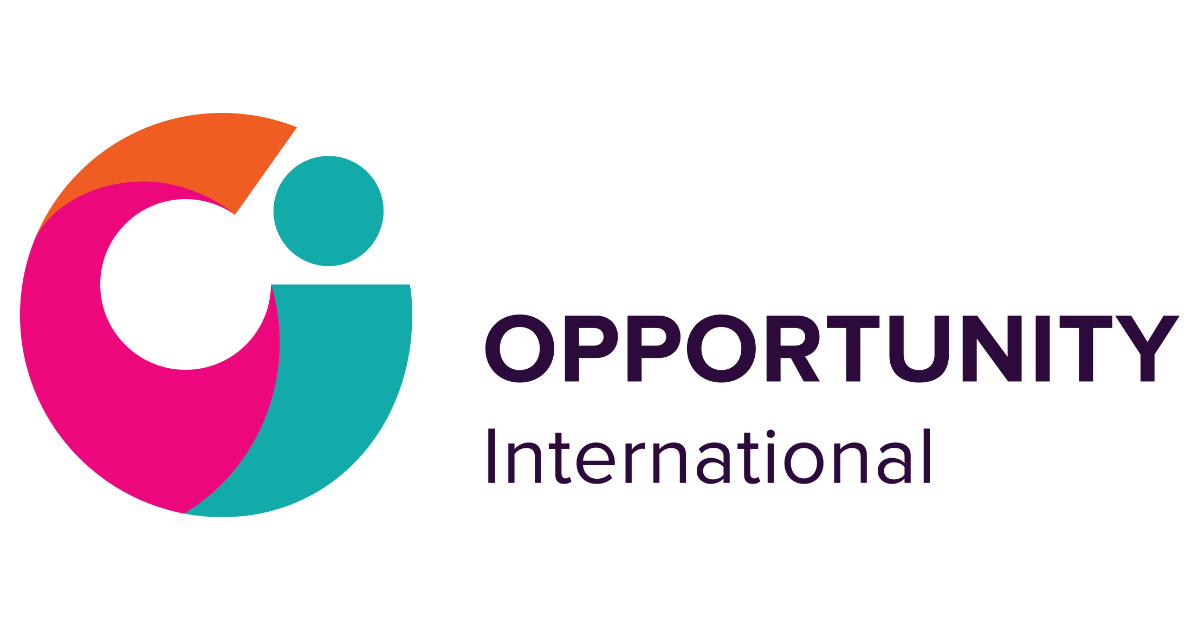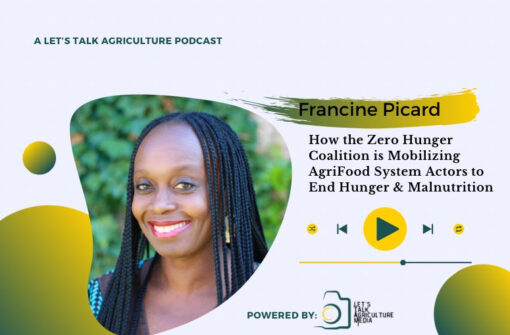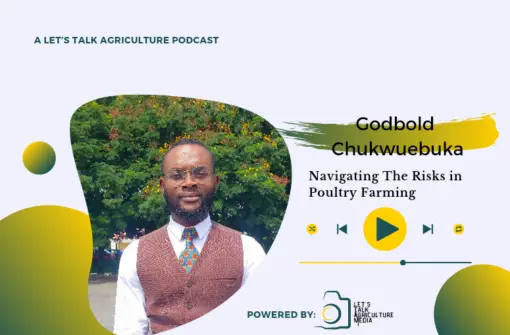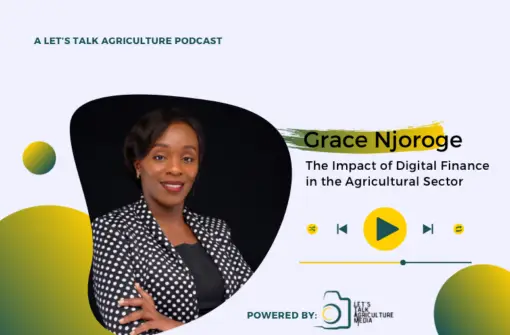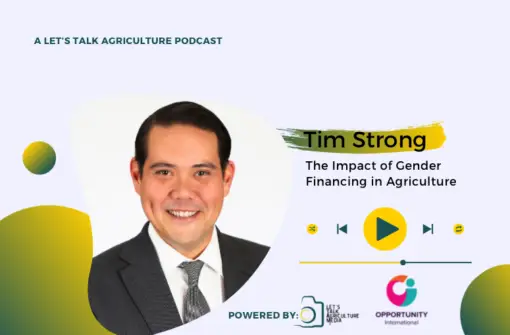Impact of Gender Financing by Timothy Strong
Transcription
Intro: [00:00:00]
Sharon Idahosa: [00:43:00] Hello beautiful people. Welcome to the Let’s Talk Agriculture podcast show, where we bring you the latest trends, opportunities, and innovations in the agriculture industry. Now this episode is brought to you by Opportunity International, a nonprofit organization equipping families with the tools [00:01:00] and training that they need to build their businesses, improve harvest, provide for their families and send their children to school, and even break the cycle of poverty.
Now talk about innovative financial solutions. They can help families living in extreme poverty to build sustainable livelihood. Now, if you’d like to learn more and support the work that they do, quickly visit opportunity.org. Now, this is me bringing to you the impact that they have created so far when it comes to gender financing.
We already know that women face so much challenges when it comes to getting access to finance. And if you’re one of those, this is the best place, you know, to, you know, learn and get access to this initiative that they’ve put in place for you as a woman. And of course, if you are one of those supporting women, this is the best place to go.
So, I encourage you to really just check out opportunity. org to see the best [00:02:00] ways that you can benefit. So, joining me today is Tim Strong, head of agricultural financing at Opportunity. Tim has successfully led the agri finance initiatives with his team in Malawi and beyond. Hello, Tim. Thank you so much for joining the show today.
How are you doing?
Timothy Strong: Thank you, Sharon. I’m really excited. As I said about it being Friday, I’m looking forward to the weekend ahead. It’s absolutely a pleasure to be invited to join you on the podcast today.
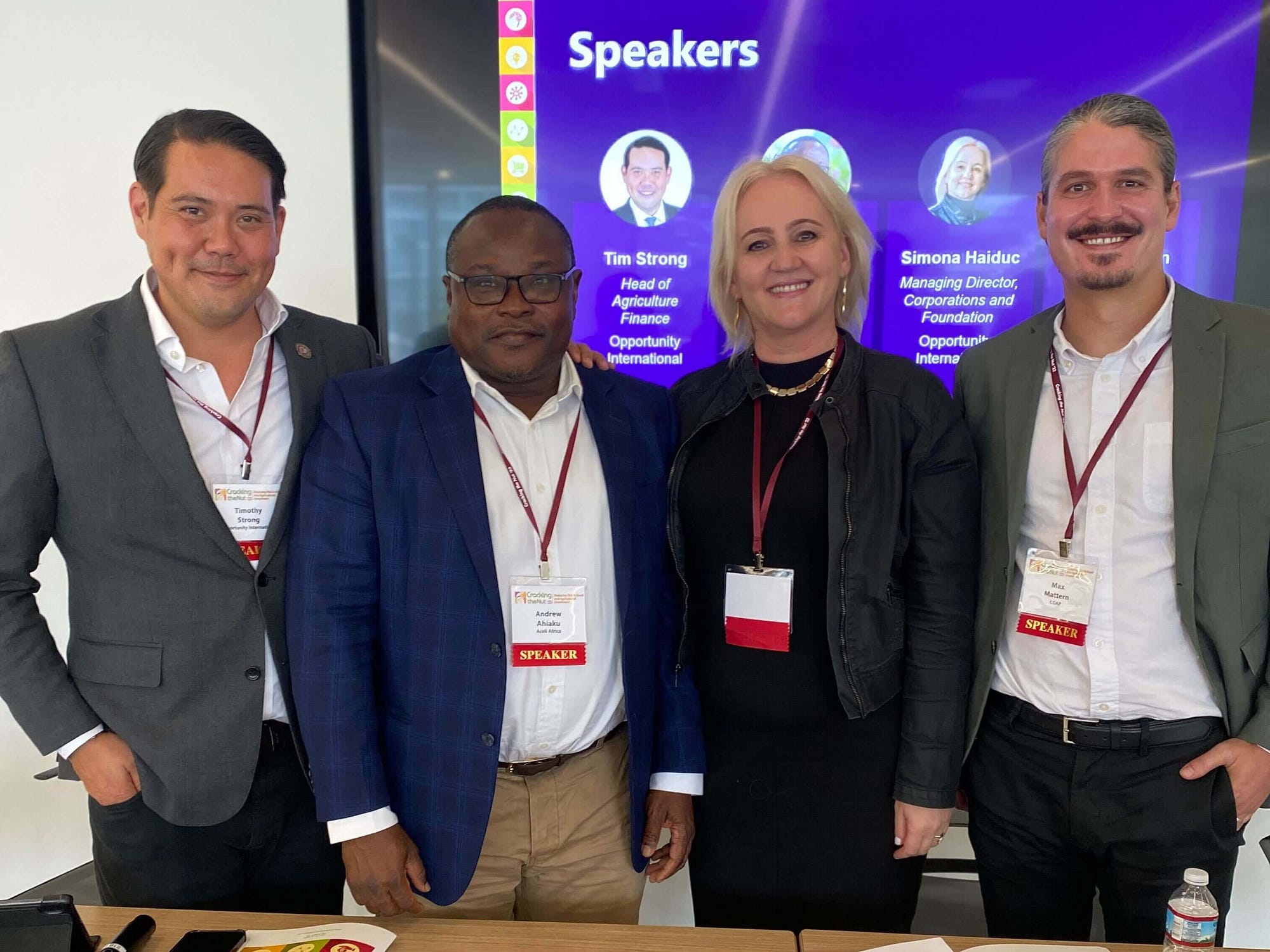
Timothy Strong of International Opportunity on the left side
Sharon Idahosa: It’s a pleasure to have you. I mean Fridays just look almost the same to me anyway. So, yeah, I looked through, um, the recent feature with you and your team on Bloomberg and I must say that you have done incredibly well.
I mean a great job so far. So, I mean, why don’t you share with us Um, the objectives of the gender finance projects and the implementation in Malawi. I know it was Implemented in Malawi or is it beyond Africa already? But I mean, let’s just have this as a case study.
Timothy Strong: Very cool Sharon So, um, it’s definitely been a [00:03:00] pleasure to be able to spread the good news I think you and I have some very similar perspectives in terms of the gospel of the small holder farmer Uh, for us at Opportunity, it’s really been a journey for us as we’ve continued to really focus what we do on listening to our clients.
Um, so a lot of what, uh, you referenced to in terms of the Bloomberg article and how we’re innovating with generative artificial intelligence to support farmers, it all boils down to that same piece is how do we make sure that we implement human centered design. How do we become specialists and listening to the needs of the variety of clients that we have for opportunity has been, uh, as I said, a journey and we’ve been in operations now for over 53 years
Organizationally We’ve been able to reach over 19. 4 million clients and 95 percent of those whom are women. And we’ve partnered with 130 different financial institutions across 33 countries within our overall lending book of roughly 2. 3 billion. Um, over 450 million of [00:04:00] that, uh, is financing directly the unlock. Um, so for us, we really see our mission and our mandate to really make sure that we’re bringing together the right partners and the right relationships to access, uh, to really have a centered focused on X.
It’s really, you know, capital as an access piece for farmers, training and support networks. Um, really a lot of this, uh, builds up on that, but, um, for our team and our program. We’ve come together for agricultural finance around a belief in rural prosperity. How do we really see that farmers are the major driving engine of economic growth in all of the countries that we live in?
And how do we make sure that they’re served as such? So, when I, when I mention rural prosperity in shorts, our mandate as a program is helping farmers to grow more. And to earn more. Um, and really that becomes one of the most. So, we see that investing in agriculture is one of the most powerful actions we can take for more inclusive future, more opportunities and agriculture mean that fewer people go hungry, fewer children miss [00:05:00] school, and rural families are able to build.
So, you know, that’s a really ambitious goal for us as a program and as a whole. And yet, we’ve really developed our work and our portfolios because of one key fact. And it’s really that many farmers here and across sub Saharan Africa still only do at 20 to 30 percent of them. So, for us, really making sure that we’re supporting farmers again, on that same mandate of supporting farmers to grow more and to earn more is key.
Um, but you know, for us, When we look at some of the numbers and the figures and listen to our, listen to our clients, we also see that on average, about 55 to 60 percent of all labor on all farms across Africa is conducted by women. So, if we’re not really developing strategies, tactics, and mechanisms to make sure women are included in this economic growth.
Then we’ve lost the plot, um, we’ve really missed the target as a whole. Um, so Sharon, I am really grateful for the time today to really share in terms of opportunities, [00:06:00] agriculture, finance, work, and our women’s economic advancement strategy. Uh, my team has given me a liberty to name the strategies. So, we’re calling it our GROW strategy, which is Guaranteeing Rural Opportunities for Women.
It’s really exciting for me to be able to share, uh, the Uh, what we’re launching now after we’ve conducted a number of highly rigorous equity audits across our programming and our staffing, how do we really define support and targets for partners and outcomes for women? Really defining our activities and targets across all of our programmatic pillars, uh, and committing to, to partnerships with specialists.
Uh, especially for areas that are outside of our, our own professional remits. So, you know, specifically looking at violence against women, how do we make sure we build partnerships? Um, so that’s just kind of a briefer in terms of what we’re looking at, but ultimately have a very robust, in my opinion, strategy for how do we move forward and really look at why this is important to us as an organization as a whole.
So, Sharon, that’s kind of the brief overview. [00:07:00] Um, I can of course talk for hours and hours and hours as I think, Sharon, you can acknowledge, um, around what we’re striving to do, but we’re really excited about next steps.
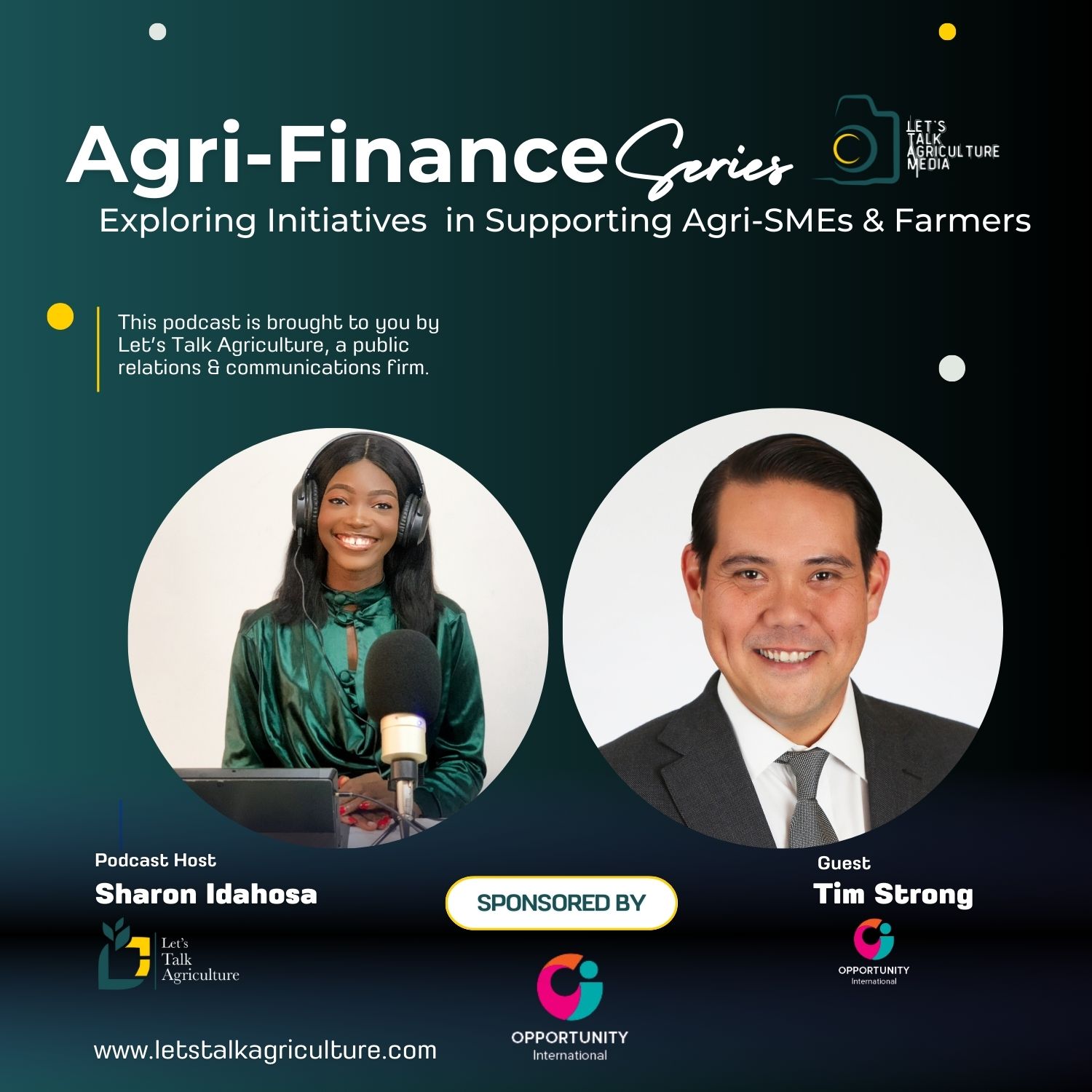
Sharon Idahosa: Yeah, I know definitely women contribute greatly to the agricultural sector, but they still definitely face some sort of, um, barrier when it comes to accessing finance.
And it’s really amazing to know that, um, your team is doing something to get them involved. I mean, they contribute, I think, about 60 to 70 percent of the food that we eat, they are majorly, um, women involved in farming. But yet, we still see them getting, um, um, struggle when it comes to accessing finance.
And most of the financial institutions, um, Um, I believe that they should, um, tailor some of their policies or tailor the products to the farmers directly. And I think I heard you saying something about, um, speaking to the farmers to know what they need for you to, you know, um, set up. a [00:08:00] policy or a product that fits them.
Because sometimes I don’t know about your location, but I know that, um, I’ve heard so many farmers complain about, um, having to, um, bring their husbands, you know, get access to finance that they need to, you know, scale business. I think is, um, sorry to say, but if you ask me, I think it’s ridiculous. I mean, because sometimes.
And in some locations, rather here in Nigeria, uh, many of the farmers are women, right? And, um, their husbands are not involved. And when they go to the farms, most of the husbands end up collecting the, the funds that was given to them because they had to bring their husbands, you know, head of the home to get access to that finance.
But I think that if there is a particular, um, product that is targeted to women and they do not need to Um, um, fill out all of those criteria or have to bring their, their, their husbands, you know, get access to finance, they will [00:09:00] be able to have access or better control of the funds that they’ve been given, and they will be able to scale their businesses without, um, in form of, um, challenge.
So I would like to know, maybe there’s some sort of, um, innovative approaches or technologies or something that have been leveraged by your organizations, you know, support women in accessing this finance without experiencing all of this barriers or something.
Timothy Strong: Yeah, sure. And I, um, would love to, to dig into this deeper.
And this is a topic that’s very near and dear to my heart as well. Um, especially as my wife is also a woman in agriculture, as we have a small cattle farm in the Southern part of Malawi. So, um, definitely see firsthand a lot of the limitation. Um, first off, I think there are two really important points from the last five years of our overall gender strategy within our agriculture finance and a running, uh, from 2018 until now, as we’re looking to revamp our approaches, um, the first and foremost is that [00:10:00] women and gender, it’s not a monolith, right?
So really understanding that one woman’s need is not the same as the next. So, making sure, uh, as you, as you called out from the previous comment that we’re listening and understanding to the varying needs of different women in agriculture. I can guarantee you that a woman who’s running a multinational dairy business Central Nigeria.
Her needs and, and her educational background and her capacity is extremely different from a small holder farmer in Uganda or in Rwanda. So, making sure that you’re building specifically to clients’ needs, uh, regardless of gender and then applying a gender lens afterwards. Um, so you know, when we looked at that and also looked at developing.
Really a business case for financing rural women, uh, where we really can talk to financial institutions and many will say outright many bankers across the continent say, yeah, we know that women are better investment than their male counterparts. They repay better in general, they have a lower default [00:11:00] rate, but very, very few of these bankers could actually say by how much.
How much better is a, is a, is a female farmer as a client to a bank than a male. And it really became just anecdotal and just comments. So really making sure that we can measure that on a portfolio by portfolio basis is critical. Um, when you’re able to do that and really have the data on hand, that means that a financial institution can do risk adjusted pricing.
And really make sure that, you know, those clients who are women within their portfolios, who are better investments and better clients can get better access to better terms. So really making sure that we have the numbers there is important for anyone within the, either the financial industry or the agriculture, I’m really proving it and, and saying it’s more than just anecdotal and an observation on those two things in particular paired with making sure that we’re training on farming as a family business, inclusive business, how to husbands and wives work together for access to resources, access to decisions
That [00:12:00] helped move our portfolios from what was historically only 18 to 28 percent women to now, you know, we’re able to really, uh, expand our financial footprints to, uh, our agricultural finance portfolio sitting.
Roughly at about 56 to 61 percent fans, right? And then, and this is in two heavily male dominated sectors of agriculture and finance. Um, for us, it’s also, you know, we, we already know. Oh, that agriculture growth. And we also know that women provide the majority of agriculture labor. However, Sharon, to your points, due to a lack of agency, resources, women farmers’ productivity, and incomes are significantly lower than those of men.
So when we look and scan through those constraints, constraint to productivity is the ability to invest in your ag, as we also know access to finance, to be able to make those investments is particularly limited to women due to Collateral requirements, saying a typically own fewer assets and land on many financial service providers are reluctant to lend to women as they [00:13:00] view them as more risky, despite stating that women are better investments, but I think there’s also some cultural norms that we have to take into account and really reflect that these do influence women’s unpaid care work.
Decision making and agency safety and time use all of these influence women’s ability to participate in and benefit from rural income generating activities. So, it is really for us, we would say this is a marathon and not a sprint. There’s a lot of things that we have to overcome in this process together to really make sure that there is equitable access, but we really do believe that offering more and equal access over control of productive resources, agricultural income.
Um, we really think that our, our clients can improve their productivity leading to an increase in economic growth and a decrease in poverty and hunger. I mean, the simplest statement I can make here is that a woman is economically empowered when she has both the ability to succeed and [00:14:00] advance and the agency to make an act on decision. So
There is so much research done and analytical frameworks considering power systems and resources, enabling environment, community and market level influences, and even in the household and how gender and social norms influence that. But I think what I like the most about our new growth strategy, guaranteeing rural opportunities for women is we’re moving beyond the discussion of gender.
Um, we’ve just spent five years talking about gender and, and how to really grow that. But for us, you know, making sure that we have a stronger focus explicitly on outcomes for women instead of gender, right? So, we will do the gender work as long as it results in those same outcomes within our side a lot of it is making sure that we’re looking at women’s economic advancement being guaranteed throughout our program, right?
So, it’s incredibly important for us to focus and listen to it in order to [00:15:00] actually deliver results. We also have to look at our partners and really how they’re working and also look at ourselves. It’s weird to look at our staff, really acknowledging that women’s economic advancement is not a vertical, um, but it’s actually a horizontal that cuts across all of them.
So, these are really important pieces for us as we can design and develop, deploy, looking at increasing, not just the numbers of female clients that we’re able to, but also making sure, proving the quality of the service that we’re providing, credibly important, especially given the constraints that are unfortunately still holding many women back.
So, you know, we developed it as kind of the launch to our new growth strategy and women’s economic advancement, uh, really a commitment statement for our program, really looking at what is our vision here. First and foremost, our vision is that both men and women have the right to increase their yields and their income, to grow more.
For us, we need to ensure this. And we are committing to designing and implementing our programs to address the [00:16:00] unique challenges that women face, right? So how do we make sure that we’re creating opportunities for all people we work with to access and benefit equitably, there’s a lot of design in there.
That’s really critical. Um, Sharon, let me share a, just a quick anecdote from my side, from this was five or six years ago, uh, in central Ghana, one of our partners had just launched a new, uh, mobile money banking platform. I had the privilege of leading a handful of focus group discussions with rural women who were in agriculture as well.
Those urban women who were in agricultural training, and we did this very extensive human centered design process. We did client journey mapping. There were post it notes, sticky notes, flying left, right, and center and large sheets, and really, you know, a lot of the women I was interviewing were saying, we absolutely hate this interface.
We don’t know how to use it. Uh, sometimes it doesn’t work in the right fashion. We’re not getting report backs. And you know, to be honest, I was actually getting kind of depressed. Like we, we [00:17:00] missed the mark on this one. Um, and in kind of a human centered design, best practice, we have the focus group stand up with a picture of their client journey map, and we take a photo of it and we send it, it was at that very moment where one of the focus group discussions had said that learning digital tech.
Apologies was too diff the entire group said, Hey, can you send me that photo on WhatsApp? And then Sharon, I think you could see where I’m going with this, right? So all of a sudden we tore up those papers and started all over again saying, okay, tell us about WhatsApp, right? Why does it work for you? Um, who taught you how to use it?
Oh yeah. Kids taught us how to use it. We’re use it to, to message our friends and understand and learn more. And I’m sharing, you know, when we look at what was highlighted in that Bloomberg piece about use AI, why do we need to rebuild platforms if we Already know that there are those that exist within this world where their user interface is appropriately serving female clients, right?
And we just built a chat bot and ran it, ran all that, all of that machinery in the background. [00:18:00] And the only change that our female clients had to make was to add a new phone number to their contacts. And then they ran off of WhatsApp, right? Just like, I don’t know why we overbuild this sometimes.
Sometimes the easiest answer is the straightest answer and the best answer.
Sharon Idahosa: I know. I mean, why do we have to go through all of that? Sometimes I think just, um, collaboration is just the most important thing for us, especially in this sector. I mean, if you already have someone doing this, why don’t you just partner with this person to achieve yours?
Why do you have to build from scratch? I think that’s really exhausting if you ask me. If there’s already a platform that’s doing this, why don’t I just leverage this platform already? Why do you have to go through, um, another strenuous process of building yours? When you can just, um, um, take from this other person.
So I think that, um, collaboration is very key when it comes to, um, the agricultural sector. And one thing I’ve noticed, um, so far is that it’s very difficult for us in this space to collaborate. Do [00:19:00] you think that way too? Because I have seen it. I’m not pushing us on the bus, but I’m just saying that. This sector, it’s, it’s, it’s very difficult to collaborate.
Everybody wants to do their own thing. I mean, so many marketplaces. I mean, come on, why do we need to have different marketplaces? Everybody building marketplaces, um, for food, for commodities. I mean, when we can just I mean, what do you think? I mean, am I just thinking so, so, so far?
Timothy Strong: Sharon, a hundred percent.
And, you know, for us, this is a key part of our strategy partnerships. I’m based in Malawi. I’m a permanent resident at his home. And I am privileged to get to spend a lot of times with the farmers, a lot of time with the farmers that we serve. And, you know, for any. One that spends a lot of times with time with farmers and rural clients, we speak in proverb, um, you know, what the elders used to say in Malawi, we have an expression with the farmers that says, which is one head can’t put the roof on a grain silo.
Um, that we [00:20:00] really have to do this in partnership, otherwise we’ll not, we’ll not succeed. Um, so that’s actually one of the core reasons why I wanted to come on to your podcast, Sharon, and let’s talk agriculture is really for us, we run the risk of not knowing what we don’t know. So, I really do want to invite listeners, invite yourself, Sharon, to comment in terms of what we’re trying to do, um, really share lessons learned as we’re looking to increase investments on our own internal capacity
How do we look at improved systems, processes, and training? Um, how do we ensure the representation of women within our team? How do I make sure that the agriculture finance program opportunity international is a great place for women to work in?
That’s huge for me, right? To really celebrate that diversity within our program staff. Uh, and how do we also enforce system and program wide mandates looking to monitor, analyze, and our own data? We really need to be nuanced in this and really your listeners and the guests that I have the opportunity to [00:21:00] speak to today, really informing how we change, how we move, how we try to be catalytic within a sector that is, um, you know, we’d have to acknowledge not the best at serving the needs of female clients.
Um, I, I would just love to, to share more ideas to understand and learn more. Um, really how do we move from being technical experts to just being experts in listening? Sharon, I, I think
Sharon Idahosa: definitely. So of course, we’re going to push this out for a lot of people to see and to learn, you know, so many people do not have access to all of this information, and that is why we exist so that we can push out this message and ensure that it reaches the right, um, people that needs this.
So, thank you so much for actually joining the show. I really appreciate it. But then again, let’s just dive to your five year advancement, um, finance project. What are the goals and strategies that will be implemented or employed to further advance women’s participation in the agriculture sector through your financial [00:22:00] empowerment?
Timothy Strong: Sharon. So, I think, uh, and that’s really where the rubber hits the road, right? We can all talk in broad terms about what we’d like to do, but then the question becomes, so what, what are you going to actually do? Um, so for our GROW strategy or guaranteeing rural operators for women. We’re looking at it threefold.
What do we do through ourselves? What do we do through our financial institution partners? And then what do we do through a lot of our support networks that really push training? And access to markets for the farmers. We serve. Um, I think it’s always good to look at ourselves first. So, you know, as we’re implementing this new strategy, we’re continuing to undertake internal procedural reviews with the gender lens sharing.
Even what my director of operations, Marissa Benner has launched within our team has been phenomenal. We, we do a screen. Screening a gender lens screening of all job descriptions. How do we look at what we require in terms of travel and operation, um, that really are balanced well [00:23:00] for, for women that want to, how do we review and revise our recruitment pro practices within that?
Um, how do we describe the jobs that, how. Um, but even deliver foundational gender inclusion training for all of our, I’m really ensuring that, um, that really, I think is the number one compelling way for us to start making that the number of team members within our program start to increase in terms of women, uh, as well as our, our last mile agents that are serving rooms.
Um, again, this, this vision of making our place an amazing place for women. Um, in terms of the last mile agents, we call farmer support agents who are local community leaders. We have an. Awful lot that we were seeking to achieve in the next few years. So, we’re really making sure that we’re identifying labor saving technologies, reduced women’s household and agricultural drudgery.
One of my good friends, a gentleman named Diborne Chibongo used to say short handled hoe is a weapon of mass urbanization. And that sometimes the drudgery within agriculture really pushes an [00:24:00] urban movement because people flee That type of work. Um, I think making sure that this is done, particularly for women to make their work with an agriculture rewarding.
And, you know, to be very short about it. How do we make sure that agriculture is cool? Uh, how do we see agents with smartphones using generative artificial intelligence to link their farmers with markets? That’s just phenomenal for me in terms of what we might be able to do. Beyond that, making sure, Sharon, to your point, that partnerships are built, that we’re identifying local community-based organizations, working in our same geographies, on changing methodologies, building and supporting for women farmers, as well as women agents.
And then also making sure that everything we’re doing for training our agents is designed in a gender inclusive way. Taking into a specific account, the additional challenges that when it faces, especially if it’s residential training over several days, considering the timing locations, providing childcare to really minimize the impact [00:25:00] on women’s, uh, women’s lives.
Um, so a lot of this is really building around even the curricula that we have for clients. So regenerative agriculture, how do we make sure that that’s gone through a gender lens review? How do we make sure that there is no unintended adverse impacts? Impacts for women, right? Are we inadvertently increasing labor requirements or conflicts due to gender crop divisions?
Um, how do we research, uh, additionality and cold storage value addition, uh, to increase women’s profitability without increasing their workloads? That’s those are the, those are the business items we would look at. Love to see finance. Um, beyond that, you know, we start to move into our financial owners.
How do we make sure they’re applying a gender line product development and delivery, right? So Sharon, very much to your earlier points, making sure that there’s flexibility built into repayment schedule, really to accommodate women’s ensuring that communications and messaging are clear. Right? Jargon free and transparent banking requirements is something that I would [00:26:00] say the industry has really failed on.
So really speak clearly to the client’s motivation needs, uh, and in, in the right avenues that are relevant. Um, and then also making sure that in credit appraisals, we can bake in, how do we build on the trust that women already have? Have within their communities and use that as part of the underwriting process.
So again, Sharon, I could go on and on and on with a lot of these things, but a lot of what we’re excited about is how do we also start placing in specifically guarantees to reduce collateral requirements from how do we make sure that women are able to apply for larger and larger loans, if that’s what their business needs, um, and are ultimately approved for that because, um, they know that.
Within the financial networks that they’re seeking service provision that someone has their back and really that opportunity international is keen to be able to be part of that support network, women’s advancement.
Sharon Idahosa: Thank you so much for sharing your toes and sharing the plan. I’m really glad to learn about the five-year plan [00:27:00] that you have.
And of course, that includes women. I mean, I’m very much I’m championing women, even though, um, uh, the, my company is not the gender, how should I even put it? So, it’s not really like we just, but then again, I just find it very much important to champion women and to support, um, the work that it’s doing.
Because I know that when we decide to get involved with something, when we get to, you know, scale it in a way that. Nobody can actually comprehend not to boast. Right. But I’m just saying, so I know
Timothy Strong: Sharon boast away, please, please. There’s a lot to be proud of.
Sharon Idahosa: Yeah. I mean, that’s, that’s what we have. So, I’m really excited to learn about this plan and I’m really going to push it out so that more women can benefit from what you have to offer.
I think this is really an exciting project and I’m really, really looking forward to what. You have in store for women. So, we’re already running out of time. So I’m just going to say, thank you so much for [00:28:00] joining the show. Hopefully we can push out the black and blog posts, and maybe you can share more, um, resourceful materials that can be added so we can push this out and ensure that it reaches more women out there, I’m really open to discussing, um, great initiatives that can benefit women in Africa.
So please do well to share something with me that you think would be amazing for women to see. So guys, we have come to the end of today’s episode. I hope you learned something from this and I hope you benefit something from this episode, because like I always say, this is an opportunity decks as well.
So you can always visit this podcast to get something meaningful. Whichever value chain you’re in so thank you guys for joining and once again team Thank you so much for sharing a clear message Yes, thank you so much for sharing today. I really appreciate you joining the let’s do a go to podcast Please do share something and say what’s our audience and let’s Get the board.
Timothy Strong: Awesome, [00:29:00] Sharon. Just absolutely a pleasure to be invited and to be working alongside powerful women in agriculture like yourself. Thank you,
Sharon Idahosa: Brian. Thank you so much. My shoulders are high right now, but thank you. so much guys. So guys do also follow us on Um, our social media channels, we are on Spotify, we are on Apple, we are on Deezer, we are on TuneIn.
I mean, which, whatever platform you can think of, we are there. So please do well to visit, explore episodes. There’s so much, I mean, over 80 plus episodes, so much for you to learn from. So please guys do well to subscribe and follow us. Once again, to have a lovely time and see you in our next episode, still on the Agri Finance series.
Thank you so much guys. Enjoy the rest of your Friday. And a thank you guys. Bye.
End of Transcription
This podcast is sponsored by Opportunity International. Opportunity International is a global nonprofit organization that creates opportunities for entrepreneurs to build their businesses, children to go to school, farmers to feed their communities, and families to end the cycle of generational poverty. For nearly 50 years, we have developed innovative programs that use financial services, training, and support to address some of the greatest challenges facing those living in poverty around the world.
You can visit their website to know more about them.
